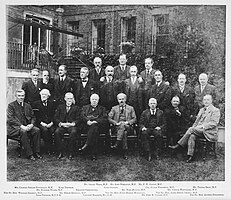
Back První vláda Ramsaye MacDonalda Czech Kabinett MacDonald I German Gouvernement MacDonald I French Kabinet-MacDonald I Dutch Pierwszy rząd Ramsaya MacDonalda Polish
First MacDonald ministry | |
|---|---|
| January–November 1924 | |
 Ramsey MacDonald | |
| Date formed | 22 January 1924 |
| Date dissolved | 4 November 1924 |
| People and organisations | |
| Monarch | George V |
| Prime Minister | Ramsay MacDonald |
| Deputy Prime Minister | [note 1] |
| Total no. of members | 58 appointments |
| Member party | Labour Party |
| Status in legislature | 191 / 615 (31%) |
| Opposition party | Conservative Party |
| Opposition leaders | |
| History | |
| Election(s) | 1923 general election |
| Outgoing election | 1924 general election |
| Legislature term(s) | |
| Predecessor | First Baldwin ministry |
| Successor | Second Baldwin ministry |
The first MacDonald ministry of the United Kingdom lasted from January to November 1924. The Labour Party, under Ramsay MacDonald, had failed to win the general election of December 1923, with 191 seats, although the combined Opposition tally exceeded that of the Conservative government, creating a hung parliament. Stanley Baldwin remained in office until January 1924.
The Conservatives had won the previous general election held in 1922 shortly after the fall of the Lloyd George Coalition when along with their Unionist allies, they had won 344 seats. This seemed a significant enough majority to expect a full parliamentary term. Nevertheless, shortly after the election the Conservative leader Bonar Law died and was replaced by Baldwin, who reneged on his predecessor's electoral pledge not to introduce protective tariffs. Baldwin sought a fresh mandate from the electorate in 1923. The result was decisive, being against protectionism, and it was clear that the Conservatives had lost, despite remaining the largest party. Baldwin had little chance of remaining prime minister when the balance of power was held by the Liberal Party under H. H. Asquith, who had campaigned vigorously for free trade, to the point of healing the rift that existed between the Asquith and Lloyd George Liberal Party factions. Baldwin advised King George V to send for MacDonald, since the Labour Party held more seats in the Commons than the Liberals. MacDonald accepted the King's commission later that day, arriving with his Labour colleagues, to the amusement of many and dismay of others, in full court dress.[1]
It is regarded as containing Britain's first working-class cabinet ministers.[2]
Cite error: There are <ref group=note> tags on this page, but the references will not show without a {{reflist|group=note}} template (see the help page).
- ^ Owen, Nicholas (2007). "MacDonald's Parties: The Labour Party and the 'Aristocratic Embrace', 1922–31" (PDF). Twentieth Century British History. 18: 1–29. doi:10.1093/tcbh/hwl043. Retrieved 6 February 2021.
- ^ Editorial (3 November 2023). "The Guardian view on class: the Tories represent their social base, Labour less so". The Guardian. ISSN 0261-3077. Retrieved 5 November 2023.
© MMXXIII Rich X Search. We shall prevail. All rights reserved. Rich X Search